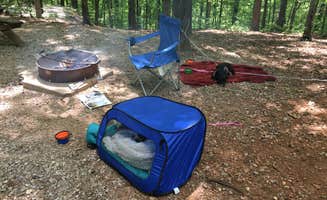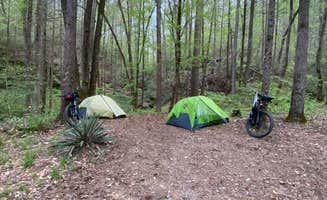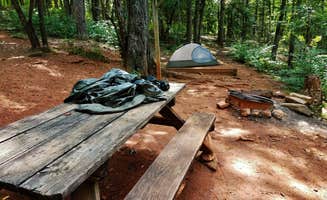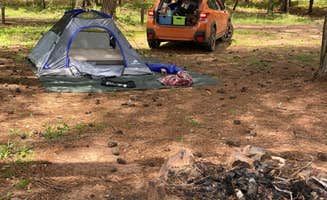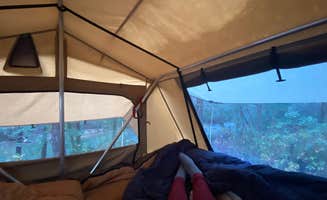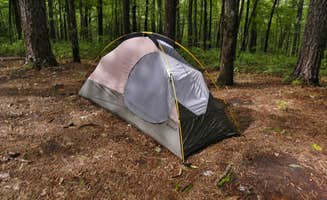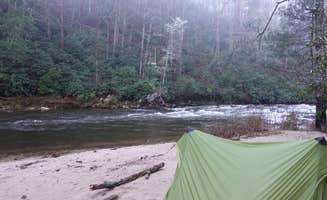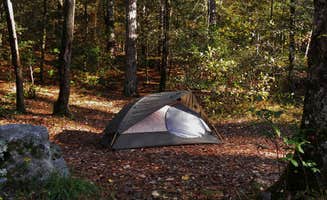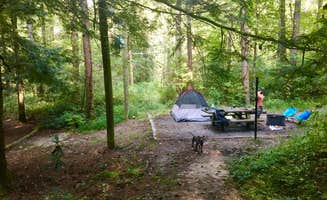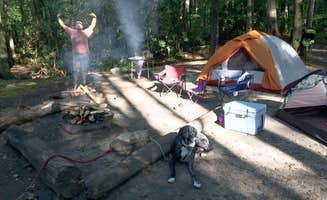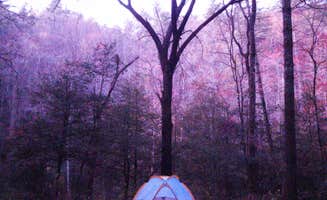Tent camping near Anderson, South Carolina offers access to several wilderness areas within the Sumter National Forest and surrounding mountains. The region has an average summer temperature of 90°F and winter lows around 30°F, with the highest elevations reaching 3,500 feet. Camping opportunities range from riverside primitive sites to more established areas with fire rings and tent pads, often requiring a short hike from parking areas.
What to do
Trout fishing opportunities: The Chauga River at Grapevine offers excellent access for anglers. "Fantastic place within the forest along the Chauga River. Most campsites are River side," reports one camper. The area is known for catch-and-cook opportunities, with another visitor noting, "I actually saw some people cooking up fish in their campsite that they caught that day."
Waterfall hikes: Several trails lead to impressive cascades from camping areas. At Panther Creek Recreation Area, the main attraction is a 3.5-mile trail to a spectacular waterfall. "The waterfall is amazing with a large pool and nice sandy beach at its base. Perfect for swimming and cooling off after the hike or camping if you are lucky enough to snag it before someone else."
Swimming holes: Many campsites provide access to natural swimming areas. "We brought some great floaties and hung out in the water during the day," writes one Grapevine visitor. The Chauga River has several deeper sections perfect for cooling off during hot summer days.
What campers like
Spacious, private sites: Many tent campers appreciate the solitude offered at Burrells Ford. One reviewer mentions, "Great for swimming and Hammocking!" The sites are well-spaced, with another camper noting, "I've been camping at Burrells Ford since I was a small child. During peak season (summer, Spring Break) it will be slightly crowded, but there's usually still room to camp and it doesn't normally get rowdy or loud."
Natural surroundings: The wilderness setting draws many repeat visitors. "I love camping here. Most sites are by the creek. And they are far enough away from each other you really feel at one with nature," says one Grapevine camper. The heavily forested camping areas provide good shade during summer months.
Wildlife viewing: The region supports diverse animal populations. One camper at Panther Creek advises, "Be on the lookout for wildlife if you camp here. I have encountered deer, skunks, opossums, raccoons, bobcats, bears and a wide variety of snakes."
What you should know
Site accessibility varies: Many camping areas require some effort to reach. At Burrells Ford, "You have to drive two and a half miles down a forest road, and then you hike about a third of a mile to the campsites. You have to backpack in and take everything you need. Make sure to take lots of water or a good water filter."
Limited facilities: Most tent sites have minimal amenities. "This is a farm and outdoor event center with a 140 acre field you can camp in... There are no defined campsites we could see. Just a giant field to set up and camp. There is no water or any hookups. You will need to pack in and pack out everything," reports a camper at Denver Downs Farm.
Seasonal considerations: Summer brings heat and insects, while winter camping presents its own challenges. "Hot and Buggy... The key thing to take a look at if planning to camp around here is the weather and temperature cause it can get pretty hot, humid, and buggy in summer," cautions one Panther Creek visitor.
Tips for camping with families
Easy access sites: For families with younger children, look for camping spots with shorter approaches. "Jones Gap gives you the feeling of really being deep in the Appalachians. The rushing river and dense foliage with tons of mountain laurel makes the air seem so fresh. Great camping spots, all are hike in. Not far, but not car camping at all," notes a visitor to Jones Gap State Park.
Kid-friendly activities: Seek out campsites with natural features that entertain children. "Love the privacy of this spot (#8) which is the closest walk in spot from the Parking area. We were able to hike in a ton of gear (coolers, dog bed, etc (with a little work and a few trips) and it was worth it for the seclusiveness. Having both toddler and dog we knew we couldn't go far but this still felt like we were in the middle of nowhere."
Safety considerations: Be prepared for wildlife encounters and changing weather. "Enjoy but cover your tracks with leaves to avoid erosion. An early morning 1 mile hike to the falls was fun. Midweek is the best time," advises a Panther Creek camper who had a "late night bear visit so best to raise your food up a free hanging rope."
Tips from RVers
Road conditions: Access roads to many camping areas can be challenging for larger vehicles. At Jocassee Gorges Wildlife Management Area, a camper warns, "Not big rig friendly. Lots of opportunities for kayaking, hiking. Not an easy place for first timers to get into. No swim access to the lake. Small campground loop."
Dispersed options: Some areas offer more open spaces suitable for various camping setups. "Very well maintained. We came here on Thanksgiving weekend because all other campgrounds were full. We were the only people here... Very close to I-85 and easy to get to. Feels very safe. A little highway noise, but not bad," reports a camper at Denver Downs Farm.


